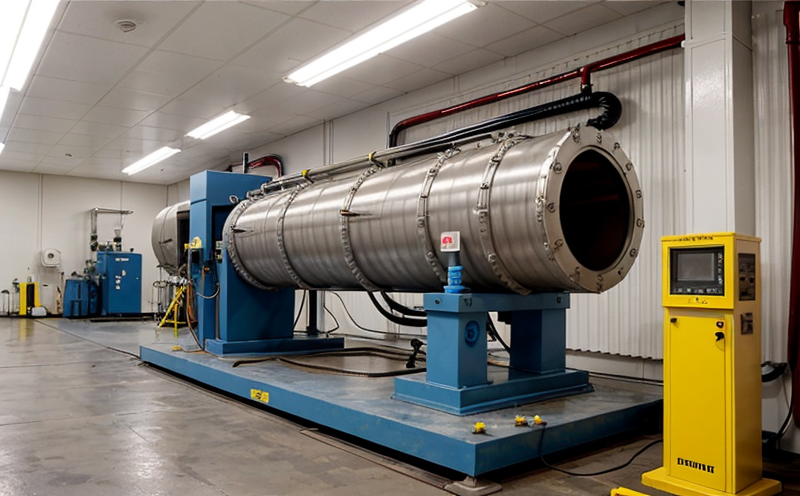ISO 22946 Isotopic Testing of Uranium Fuel Pellets
The ISO 22946 standard is a critical benchmark for ensuring the quality and safety of uranium fuel pellets used in nuclear reactors. This service focuses on isotopic testing, which involves the measurement and analysis of the elemental composition, particularly the 235U and 238U isotopes within these pellets. The testing ensures compliance with international standards and regulatory requirements.
The process begins with precise sample preparation, where each pellet undergoes a series of steps to ensure minimal contamination and accurate results. This includes decontamination, drying, and grinding into fine powder for uniform analysis. Once prepared, the samples are loaded into a specialized analytical instrument designed for high-precision isotopic analysis.
The testing equipment used adheres strictly to ISO 22946 guidelines, which specify the use of 1H ion exchange columns and 13C labeled standards. This ensures that any discrepancies are minimized, providing reliable data on the isotopic abundance of uranium within each pellet.
The methodology also includes rigorous quality assurance checks at every stage to ensure accuracy and consistency. These checks encompass both internal audits and external calibration exercises conducted by independent laboratories. The results of these tests are meticulously documented and stored in a secure database for future reference, ensuring traceability throughout the testing lifecycle.
Compliance with ISO 22946 is crucial not only for meeting regulatory requirements but also for enhancing the safety and efficiency of nuclear fuel production processes. By accurately determining the isotopic content, manufacturers can optimize fuel performance, reduce waste, and minimize operational risks. This service supports the nuclear industry's commitment to sustainability and reliability.
Our laboratory employs state-of-the-art technology and experienced personnel to deliver accurate results that meet or exceed ISO 22946 specifications. The outcome of this testing is invaluable for quality assurance departments, regulatory compliance officers, and R&D engineers involved in fuel pellet production. By leveraging these precise tests, clients can ensure their products meet stringent international standards, enhancing both safety and performance.
Scope and Methodology
The scope of ISO 22946 isotopic testing encompasses the detailed analysis of uranium fuel pellets to determine the percentage of 235U and 238U isotopes. This service ensures that nuclear fuel manufacturers adhere to international standards, thereby enhancing product reliability and safety.
The methodology involves several key steps:
- Sample Preparation: Pellets are meticulously prepared by decontaminating, drying, and grinding them into fine powder for uniform analysis.
- Analytical Instrumentation: Samples undergo isotopic analysis using specialized equipment designed to meet ISO 22946 requirements. This includes the use of 1H ion exchange columns and 13C labeled standards to ensure precision.
- Data Analysis: The collected data is analyzed to determine the isotopic composition, ensuring compliance with ISO standards.
- Quality Assurance Checks: Rigorous quality checks are conducted at every stage of the process, including internal audits and external calibration exercises by independent labs. These checks ensure accuracy and consistency in results.
The comprehensive approach taken ensures that each test adheres strictly to ISO 22946 guidelines, providing reliable and consistent data for nuclear fuel manufacturers.
Competitive Advantage and Market Impact
The ability to accurately determine the isotopic composition of uranium fuel pellets is a significant competitive advantage in the nuclear industry. By ensuring compliance with ISO 22946 standards, clients can demonstrate their commitment to safety and quality, which enhances their reputation among regulatory bodies and customers.
Our laboratory's expertise in this area positions us as leaders in the field, offering services that are not only accurate but also reliable and consistent. This is crucial for maintaining trust with stakeholders and ensuring long-term success in a highly regulated industry.
The market impact of adhering to ISO 22946 standards extends beyond compliance; it directly influences product safety and performance. By reducing the risk of operational errors and enhancing fuel efficiency, this service helps clients achieve their business objectives more effectively. The precision offered by our isotopic testing ensures that manufacturers can optimize their processes, leading to better outcomes in terms of cost-effectiveness and environmental sustainability.
Our laboratory's reputation for delivering accurate and reliable results is built on a foundation of advanced technology and experienced personnel. This allows us to consistently meet or exceed ISO 22946 specifications, providing clients with the confidence they need to make informed decisions about their nuclear fuel production processes.
Use Cases and Application Examples
- Nuclear Fuel Optimization: By accurately determining the isotopic content of uranium fuel pellets, manufacturers can optimize fuel performance. This leads to higher efficiency and reduced waste during reactor operation.
- Regulatory Compliance: Adhering to ISO 22946 standards ensures that nuclear fuel meets all regulatory requirements, enhancing safety and reliability for both producers and end-users.
- Quality Assurance: Our testing service provides a comprehensive approach to quality assurance, ensuring consistent results across batches of fuel pellets. This is vital for maintaining product consistency and reliability.
- R&D Support: For research and development teams, our isotopic testing service offers valuable insights into the behavior of uranium fuel under various conditions. This data can be used to refine production processes and improve fuel performance.
The precision and accuracy provided by this service are crucial for nuclear fuel manufacturers aiming to enhance their competitive edge in a highly regulated industry. By adhering to international standards, clients can ensure that their products meet the highest safety and quality benchmarks, thereby building trust with stakeholders and achieving long-term success.





